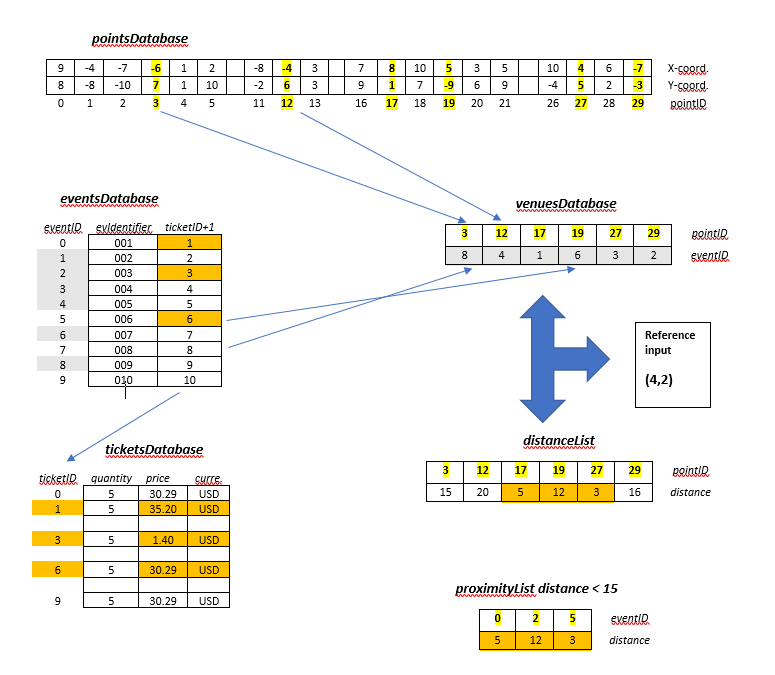- clone the repo and install Node.js modules
$ git clone https://github.com/elenamorton/events_manager_js.git
$ cd events_manager_js
$ npm install- run tests
$ npm test- start up the CLI Node application
$ npm start- Vanilla JavaScript ES6
- NodeJS v8.2.1
- Npm v5.3.0
- Test suite based on Mocha(v3.5.0), Chai(v4.1.0)
- Seeded randomizer using Chance(v1.0.10)
Write a program which accepts a user location as a pair of coordinates, and returns a list of the five closest events, along with the cheapest ticket price for each event.
- The program should randomly generate seed data
- Program should operate in a world that ranges from -10 to +10 (Y axis), and -10 to +10 (X axis).
- Each co-ordinate can hold a maximum of one event
- Each event has a unique numeric identifier (e.g. 1, 2, 3)
- Each event has zero or more tickets
- Each ticket has a non-zero price, expressed in US Dollars
- The distance between two points should be computed as the Manhattan distance
- The user is not introducing a reference position out of the [-10..10] range on any of X and Y axis;
- The 'proximity' algoritm that determins the closest points to the reference location is set as 'less than 15', as a Manhattan distance to the other points;
- There cannot be duplicated events in the venues hash, or duplicated locations;
- Each point contains a X-coordinate, and a Y-coordinate;
- The pointsDatabase is an array of points. A pointID is the index in this array;
- Only 30 points are randomly generated in order to cover the required 3, 5, and 12 distances;
- Each ticket contains the number of tickets available, a price (default is 1), and a currency (default is USD);
- The ticketsDatabase is an array of tickets. A ticketID is the index in this array;
- Each event contains an identifier (between 0 and 999), and a ticketID;
- The eventsDatabase is an array of events. A eventID is the index in this array;
- Each venue is made up of a hash with the eventID, as key, and a pointID, as value;
- The venuesDatabase is an object containing the number of venues (as the object length), and hash with available venues;
- Current implementation contains:
- 30 locations (points),
- 10 tickets types,
- 10 events, and
- 6 venues
$ npm start
> event_manager@0.1.0 start /home/ubuntu/workspace
> node app/app.js
Please enter a position (x,y) or <ctrl>D to exit:
> 4,2
Closest events to (4,2):
Event 003 - $30.29, Distance 3
Event 001 - $35.20, Distance 5
Event 006 - $01.40, Distance 12
> end- Memory implementation of point, ticket, event, venue collections
- Adding nedb lightweight JavaScript database
- Under current implementation, a simple way is to expand the Venue hash value from a pointID, to an array of pointIDs, to allow the multiple locations to be added for an event. The length of the array will give the number of events hold at that location (point);
- A better implementation, would be to change the arrays/hashes implementation to a lightweight database like nedb, and add camo as a data mapper to get the models mapped to database collections. With this aproach, we only need to add a 'belongs to'-like colomn in the Event model, to contain the pointID from the Points collection.
I would think of several changes that are needed in order to support larger data storage, fast queries, optimisations to avoid often database access.
- Change all data storage from current arrays/hash to a database like MongoDB, to accommodate a larger data collections to be stored in a persistent environment;
- Adding an algorithm to optimize the search times. I would make a list of the 'Five hotest events', and keep it into the memory. This will avoid accessing the database for every query, making the application faster.
- Replace the simplistic 'proximity' algorithm to a more comprehensive one to take into account serveral criteria.
- If two locations have the same Manhattan distance to the reference point, and not both will fit into the 'Five closest', I would consider 'time of travel' for instance, and choose the quickest one into the list.
- Expand the input to add 'number of tickets'. If not all of the 'Five closest' events hold the required number of tickets, I would discad them from the list, and search for others further distance, that have the number of tickets required;
- Maybe, take into account desired facilities at the venue. Venues not meeting the requests will be discarded from the 'Five closest' list.

